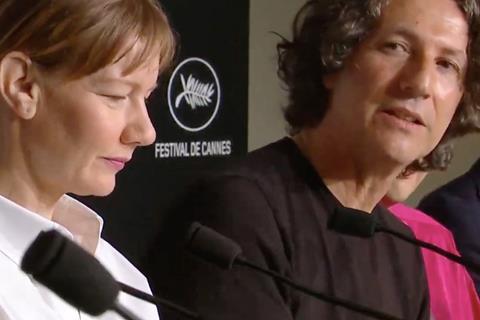
Jonathan Glazer said his Auschwitz drama ‘The Zone Of Interest’ is “trying to talk to the capacity within each of us for violence.”
Speaking at the press conference for the Cannes Competition title, Glazer responded to a question about the film’s relevance in the light of modern far-right movements.
“To try and show these people as people and not monsters was a very important thing to do,” said Glazer. “The great crime and tragedy is that human beings did this to other human beings.
“What it’s trying to do is talk to the capacity within each of us for violence. It’s very convenient for us to try and distance ourselves from them – we think we could never behave this way. I think we should be less certain in that.”
The Zone Of Interest, Glazer’s first feature since 2013’s Under The Skin, is loosely based on Martin Amis’ 2014 novel of the same name, about the commandant of Auschwitz and his family’s life situated next to the murder camp during the Second World War.
Finding new ways to depict history is crucial, according to the British director. “It’s important to find a new paradigm for it so a new generation can discover it through film,” said Glazer. “We’re trying to talk in the present tense – everything has to serve that need. It’s related to today, it’s related to every day.”
Demonisation
Producer James Wilson touched on the “comfortable demonisation” of horrific events such as the Holocaust that allows humans to build a distance from them.
“There’s a great phrase by an eminent Auschwitz historian where he talks about the ‘comfortable demonisation’ of elevating these events to the level of myth, in terms of talking about this evil – this mythic, a priori concept,” said Wilson. It has a connection to racism in contemporary society, centuries after slavery was prominent across the western world, said the producer. “As white Europeans or Americans through the accident of our birth, we were born into aspects of wealth that were gained through hundreds of years of enslavement of people who didn’t look like us – hundreds of years ago, so we’re conveniently distanced from that.”
Wilson said that the sentiments that allow the rise of far-right movements don’t just come from “extremists and neo-Nazis”, but from “ideas that are closer to home for us, in terms of sovereignty, national identity and how we need our borders to be safe and protected,” said Wilson. “Which lots of people think are what makes our lives complicated and difficult – but those possibly aren’t the reasons why they are.”
Glazer and Wilson were joined at the press conference by colleagues including composer Mica Levi, and actors Sandra Huller and Christian Friedel.
Friedel starred in Michael Haneke’s 2009 Palme d’Or winning-The White Ribbon, set in a village in northern Germany prior to the First World War. The Zone Of Interest is “like a sequel” to that film said the actor. “I think a lot about the connection to Haneke – to find authenticity, to act, or not to act, to be – this was the challenge in this project [too],” said Friedel.
German actress Huller “felt a responsibility as a German to portray or talk to” her character Hedwig Hoss, the wife of Friedel’s camp commandant Rudolf Hoss. “I never felt familiar with her,” said Huller. “At the same time, I felt there is no real way to do it right. It was never about being good at something or doing something extraordinary. Little to do with acting – it had to be connected with presence, listening and being respectful with each other and the people around us. It didn’t have anything to do with ambition, for everybody.”
Huller also said she has “no idea” about the progress on a US remake of her Cannes 2017 title Toni Erdmann, which has been through several potential iterations. “I would love to see this version of the story, but I don’t know when, with whom, where – no idea, sorry,” said the actress.
The Zone Of Interest premiered to acclaim in Cannes last night; Screen’s review described it as ‘essential viewing and a work that will be a vital focus of discussion both in the cinephile world and beyond.’ A24, which produced the film alongside Film4, will distribute in the US.

























No comments yet